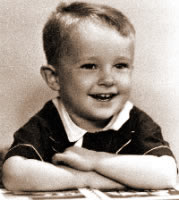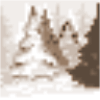
Hints
from Yesterday:
A Piper City Christmas
by Frederick Borsch
My
grandfather Houk was an undertaker. He lived in an Illinois farm
town some forty miles south of Kankakee and ninety miles south of
Chicago. The year my mother Pearl was born six hundred and fifty
people lived in Piper City. Only a few more than six hundred and
fifty live there now.
My
grandfather was the most important person in Piper City. The few
other professional people—a doctor, a lawyer and a clergyman—came
and went, but grandfather was there to stay. He had been with many
of those families through their toughest times. Although only educated
through the eighth grade, he was sought out for advice on numerous
matters.
He also owned a furniture store uptown, as they called the little
cluster of stores lined up on both sides of the Toledo, Peoria and
Western railroad tracks. A generation earlier an undertaker in similar
circumstances might have made his own caskets. Now Ernest Houk sold
furniture and caskets.
 The caskets, however, were not in the store. They were in the house
that was both a residence and a funeral home. Two rooms upstairs
had open caskets on display. Downstairs, across from the kitchen,
there was a preparation room for the bodies and a hand-drawn elevator
to bring the caskets up and down. I thought that elevator was one
of the greatest inventions in the world.
The caskets, however, were not in the store. They were in the house
that was both a residence and a funeral home. Two rooms upstairs
had open caskets on display. Downstairs, across from the kitchen,
there was a preparation room for the bodies and a hand-drawn elevator
to bring the caskets up and down. I thought that elevator was one
of the greatest inventions in the world.
Out
in back was the barn. A generation or two earlier a predecessor
of my grandfather would have kept a horse-drawn hearse there. My
grandfather had a big black motor hearse that he used to bring the
bodies to the house as well as bear them to the cemetery later.
Sometimes the hearse doubled as an ambulance if an accident occurred
on one of the nearby highways. Also out back was a horse named Toots,
who belonged to my Aunt Vera.
I
remember the barn and the house as being huge. My older sister tells
me this isn’t so. Maybe the rooms were not as large as a small
boy recollects, but there were a lot of them. There had to have
been at Christmas time when we came to visit with my two sisters.
Usually my two aunts and uncles and five cousins had already arrived.
Sometimes we were so crowded that I slept on a cot outside one of
the rooms with the empty caskets. I don’t think that ever
bothered me. I may have thought that a lot of grandfathers were
undertakers.
Downstairs
there was a living room and a kind of large middle parlor and still
another room behind that. We
ate Christmas dinner in the middle parlor, but sometimes around
Christmas, and especially when I visited my grandparents during
the summer, there would be a body laid out in the middle parlor.
From time to time there might even be another one in its casket
in the rear room. Often the funeral services were held in the middle
parlor. I remember in the summer the folks sitting there on folding
chairs looking sad and hot, whispering and fanning themselves with
fans that said “E. H. Houk Funeral Home.”
There
could be long stretches, however, when no one was in that parlor
except the body in its casket with the top half propped open. It
was so quiet and mysterious I  could
not help but be intrigued, a solemn-faced boy, sometimes stepping
quite near and gazing at the dead face, hands folded on its chest.
Once in a while it would be a younger person. One time, I remember,
it was a child, and that did kind of scare me. But for the most
part the bodies looked very old. They lay on satin pillows to make
them appear comfortable, but I wasn’t fooled. The casket must
have been very hard beneath them, and, despite my aunt’s cosmetic
efforts, they seemed very dead to me. My younger sister was scared
they would move, but I knew they never would. I knew that grandfather
had drained the blood out of them and pumped in formaldehyde and
water. could
not help but be intrigued, a solemn-faced boy, sometimes stepping
quite near and gazing at the dead face, hands folded on its chest.
Once in a while it would be a younger person. One time, I remember,
it was a child, and that did kind of scare me. But for the most
part the bodies looked very old. They lay on satin pillows to make
them appear comfortable, but I wasn’t fooled. The casket must
have been very hard beneath them, and, despite my aunt’s cosmetic
efforts, they seemed very dead to me. My younger sister was scared
they would move, but I knew they never would. I knew that grandfather
had drained the blood out of them and pumped in formaldehyde and
water.
I wondered what had happened to them. I wondered what it was like
to be alive and then to be dead. I wondered how they had died. I
wondered where they were now. The grownups said they were at peace.
I
was pretty sure that under the half of the casket that was closed
they didn’t have on any shoes. What would be the point? I
kind of wondered why they wasted dressing them in their good clothes.
Some of them wore their glasses too.
A
few times I came so close that I touched them, putting my hand on
their foreheads. It was like putting my hand on a cold stone. I
discovered that if you pushed on the nostrils of a dead person they
would stay in. I don’t imagine I was allowed to do that more
than once.
 We
usually arrived on Christmas Eve about suppertime. Excited as we
were about Christmas and seeing each other, after supper we soon
fell into the deep sleep of kids. But the next morning it was quickly
one up all up. We eyed the presents under the tree, making our guesses
and tantalizing one another if we thought we knew what someone else
was getting that year. Aunt Vera played the piano and we sang. Some
of the songs didn’t have anything to do with Christmas: “You
Are My Sunshine” and “Twinkle, Twinkle Little Star,”
though I suppose one could think of that as the star of Bethlehem. We
usually arrived on Christmas Eve about suppertime. Excited as we
were about Christmas and seeing each other, after supper we soon
fell into the deep sleep of kids. But the next morning it was quickly
one up all up. We eyed the presents under the tree, making our guesses
and tantalizing one another if we thought we knew what someone else
was getting that year. Aunt Vera played the piano and we sang. Some
of the songs didn’t have anything to do with Christmas: “You
Are My Sunshine” and “Twinkle, Twinkle Little Star,”
though I suppose one could think of that as the star of Bethlehem.
The
waiting seemed forever. Grandfather would go up to the furniture
store to have coffee with his cronies and probably Christmas schnapps
as well. There could be no Christmas dinner until he finally came
home, carrying shiny silver dollars for each of us cousins.
We
would take turns running to the corner to see if we could spot him
coming. He always had his gray fedora hat on his rather square head.
He was a taciturn man. I do not remember his ever saying much to
me, although he did teach me how to play checkers with the strategy
of making kings early.
On
Christmas morning I think I felt angry with him, making us wait
like that. And, when he did come, it seemed as though he was laughing
at us. Years later I learned that he had been waiting up at the
store for grandmother to call and say that dinner was ready. All
along it was grandmother, born Minnie Mabel Munson, but whom the
grandkids called Momo, who was the one making us do the waiting.
But
then the meal appeared in all its steaming glory: wonderful mounds
of mashed potatoes one could sculpt to create a place for gravy
and for floating a few peas, turkey and dressing, and pumpkin pie
with a big dab of whipped cream. It was Thanksgiving all over again.
Too
soon we had torn into all the presents, played with the ones that
weren’t clothes, and taken a few out into the frigid late
afternoon where our breath turned into visible puffs that the cold
wind blew away. Sometimes there was a fight with a cousin, and afterwards,
tired and with feelings I couldn’t sort out, I might sneak
off and watch Toots snort and shuffle around as the last shafts
of winter sunlight slid away, and it began to grow dark in the barn.
 There were several things
I think I was beginning to learn on those Christmases. The first
had to do with the waiting. Waiting can be hard, but it can also
help to figure things out. There can be an attentive
waiting that is not just not doing anything. It is something like
being a bird watcher. It is a way of being. One sees things that
otherwise might not be noticed. One learns to appreciate. I laugh
to remember that, because of its initials, the Toledo, Peoria and
Western railroad was also known as Take Patience and Walk. I have
more than a hunch that the people who lived in Piper City in those
days had something to teach me about waiting and patience.
There were several things
I think I was beginning to learn on those Christmases. The first
had to do with the waiting. Waiting can be hard, but it can also
help to figure things out. There can be an attentive
waiting that is not just not doing anything. It is something like
being a bird watcher. It is a way of being. One sees things that
otherwise might not be noticed. One learns to appreciate. I laugh
to remember that, because of its initials, the Toledo, Peoria and
Western railroad was also known as Take Patience and Walk. I have
more than a hunch that the people who lived in Piper City in those
days had something to teach me about waiting and patience.
I
later came to realize that there is a considerable amount of waiting
in the Bible: for children, for escape from slavery in Egypt, for
the promised land, for the prophet, for return from exile, for wisdom,
for rebuilding the holy city and temple, for the messiah, for the
kingdom of God, for God’s presence. And there is a lot of
waiting in our lives: for Christmas, to grow up, for a career, for
love, perhaps to be married, for children, for success, to be wiser,
to be mature, to retire, for a diagnosis, for the meaning and value
of life. None of these ever arrive perfectly, but in careful waiting
one may come to see what might most be worth waiting for.
A
second thing I think I began to understand is that good things can
happen in small ways.
At Christmas time we sang “O Little Town of Bethlehem”
and retold the story of the tiny baby in the manger. There were
also angels singing from on high and wise men coming from afar,
but one could not miss the point of the apparent insignificance
of it all in that stable in out-of-the-way Bethlehem. It makes me
think still of the barn and house in little Piper City and the ways
Christmas came to us there.
There
was something solemn about those Christmases too. One Christmas,
the sliding doors off the middle parlor to the rear room were shut
because someone was “at rest” there. Another Christmas
night, after all the children were finally in bed, I heard grandfather
back the hearse down the driveway to go out into the darkness on
one of those necessary errands of his.
When
I was older, I learned that in the church calendar the day after
Christmas is Saint Stephen's day when the church remembers its first
martyr who was stoned to death. Two days later is called Holy Innocents,
the commemoration of all the little ones King Herod was said to
have slaughtered when he was trying to kill the baby Jesus. We remember
as well all the children killed in war or by human cruelty and indifference.
In Piper City I was already beginning to understand that Christmas
does not come apart from tears. The deepest meaning of the joy of
“God is with us”—of Emmanuel—would have
to happen in that home with its caskets and presents, all my relatives
and the bodies at rest, Toots and the hearse, the feasting and love
and sobbing.
Images
courtesy of http://budgetstockphoto.com.
|


